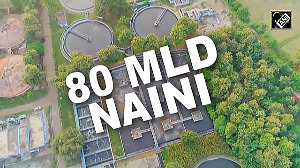Even though sources attributed the disruption on Sunday night to power outage and not a ship's anchor that affected the earlier two Mediterranean cables (FLAG Telecom's FLAG Europe-Asia cable and SeaMeWe-4), thousands of bloggers across the world are attributing this to a possible sabotage in the Mediterranean Sea in a bid to isolate Iran.
Cutting these cables might affect Iran's ability to defend itself since communication is of vital importance during military action, they allege.
The fourth submarine cable was damaged between Haloul (Qatar) and Das (the UAE). Egypt's ministry of maritime transportation, after reviewing the satellite pictures, said there were no ships (which led to the speculation and allegations) near the cable channel 12 hours before or after the damage near Alexandria, Egypt.
"...to have three undersea cables or is it actually four cables? cut in the same region in just a two-day span, strains credulity; the more so, when we look at how the damage has played out across the region... communication cable cutting in West Asia leaves Israel and Iraq still connected, while completely shutting down the Iranian internet. Funny how that works, isn't it?" asks a professor on his site.
"Seriously, is there anyone who doesn't think this is either a precursor to military action, or a direct attack on Iran's about-to-launch Euro-based oil market?" asks another blogger.
"Iran is back online, but... its traffic is now passing through the UK and the US, the latter controlling the 13 primary routers. Can you say wiretap?" queries another.
Others recall spy stories of the US Navy sending out special operations teams to go out on submarines and deploy undersea operations, on the seabed itself, specifically for cutting or tapping communication cables with special airlocks and very sophisticated equipment much of it thoroughly documented in Blind Man's Bluff: The Untold Story of American Submarine Espionage by Sherry Sontag and Christopher Drew.
Incidentally, the reason for the damage to FLAG's FALCON cable about 50 km off Dubai remains unclear. This cable is reportedly designed on a "ring system", taking it on a circuit around the Persian Gulf and enabling traffic to be more easily routed around the damage.
TeleGeography analysts say new cables planned to link Europe with Egypt should provide a back-up to prevent similar problems. They also point out that most traffic between the US, Canada and Mexico is carried over land, while there are numerous undersea cables carrying traffic under the Atlantic and Pacific oceans.
The damage to the fourth undersea cable, however, would not have an immediate impact on the internet traffic in the Indian sub-continent, but short-term impact cannot be ruled out, according to analysts.
They reason that three major cable systems bringing in internet traffic to the sub-continent have already been damaged, resulting in the companies moving traffic to other cable systems. Now, with the fourth one being damaged, the load on the existing systems would be high.
Meanwhile, internet service providers (ISPs) in India, such as Sify, have begun issuing warning that the Net access of some international websites could be slow due to the cable ruptures.
FLAG Telecom said its repair ship was expected to reach the accident spot, 8 km off the Alexandria coast, by February 5. FLAG has arranged a part of the restoration capacity on i2i system east of India and restored the internet and IPLC traffic.
Tata group-owned Videsh Sanchar Nigam, a consortium partner and network administrator for SMW-4, said it restored a majority of its IP connectivity in the Middle East and North Africa (Mena) region.







 © 2025
© 2025